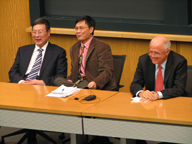Monday, November 24, 2008 | 12:00 AM EST - 12:00 AM EST
The National Committee hosted a ground-breaking visit to the United States by a ten-person delegation focusing on human rights, philanthropy, and economics. Led by Huang Mengfu, chairman of the China Foundation for Human Rights Development, the group was in the United States (New York, Washington, D.C. and Boston) November 16 through 24, 2008. The visit came at an opportune time, closely following China’s announcement that it is drafting a national action plan to protect human rights.
Huang Mengfu was elected chairman of the China Foundation for Human Rights Development in January 2008. The foundation is a national non-profit organization under the State Council’s Information Office that promotes education and research on human rights, conducts international human rights exchanges, and supports initiatives for public welfare within China.
Mr. Huang is also vice chairman of the Chinese People’s Political Consultative Conference, the PRC’s top legislative advisory body, the chairman of the All-China Federation of Industry and Commerce, and has been instrumental in the development of China’s non-public economic sectors.
He graduated from Beijing Steel and Iron Institute in 1962 and subsequently rose to become deputy director at Nanjing Steel and Iron Works. As vice mayor of Nanjing in the 1990s, he supervised the city’s industry, transportation, and science and technology. Mr. Huang’s grandfather, Huang Yanpei, was a confidant of Mao Zedong and became the first vice premier of the newly founded People’s Republic in 1949; his father, Huang Jingwu, graduated from Harvard University with an M.A. in economics.
At Harvard University’s Fairbank Center for Chinese Studies, Mr. Huang delivered an address on issues affecting human rights in China, including developments in China’s political system and government, economic and rural-urban disparities and the unique challenges of balancing reform with stability in the world’s most populous nation. He described several challenges that China is working to address that have a direct effect on human rights issues, including population, income disparities, social security and unemployment benefits and health care services.
Mr. Huang also offered a nuanced perspective on the development of human rights policy in China, culminating with the current work taking place on a national action plan. “The current degree of China’s democracy, freedom and opening-up were unimaginable thirty years ago,” he said. Transcripts of Mr. Huang’s speech, in English and Chinese, are available on this page. Mr. Huang’s talk was in Chinese with English interpretation.
The National Committee collaborated with the Fairbank Center for Chinese Studies and East Asian Legal Studies, which sponsored the event.
